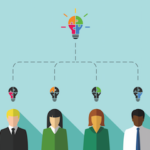 What is mindfulness, really? Mindfulness expert Leah Weiss breaks it down in this excerpt from her recently published book, How We Work: Live Your Purpose, Reclaim Your Sanity and Embrace the Daily Grind.“
What is mindfulness, really? Mindfulness expert Leah Weiss breaks it down in this excerpt from her recently published book, How We Work: Live Your Purpose, Reclaim Your Sanity and Embrace the Daily Grind.“
“All mindfulness meditation is about training the mind to be where we choose it to be and noticing when it has strayed, so we can bring it back once again. In the process of doing this, we rewire the brain so that over time we become less likely to fall victim to unwanted thought or behavior patterns. This ability to reshape our neural circuitry is known as neuroplasticity.
“This process may seem simple enough, but once you try it, you will quickly see it is quite challenging. Eventually, by continuously paying attention to the experience we are having with an attitude of non-judgment, we become more aware of ourselves, the people around us, and our environment. With practice, the neural pathways of the brain wire new patterns that help us focus and that increase our capacity for enacting our purpose, staying on task, being creative, and making better decisions.
“In mindfulness training, there is no separation between what is meaningful and what is mundane. We can practice with anything. The back-to-back demands and busyness of our days do not stand in the way of our purpose in the world; they represent a chance to realize it.
“With mindfulness, we take our challenges as opportunities and our adversaries as teachers. We practice seeing the best in others and we do the same for ourselves — not naïvely, but intentionally and strategically. When we look at it this way, we’re freed from what I call the scarcity mindset: that constant, nagging feeling that there’s never enough time or resources and that we’re not up to the task of living our life. In this way, nothing and everything changes.
“The single most important takeaway from traditional mindfulness training is that it teaches people to see their thoughts and feelings as just thoughts and feelings rather than as something loaded with meaning that defines who they are. It is the difference between being in the fray but not of it. This is a big deal, with tremendous practical implications for our day-to-day lives.”
— Leah Weiss



